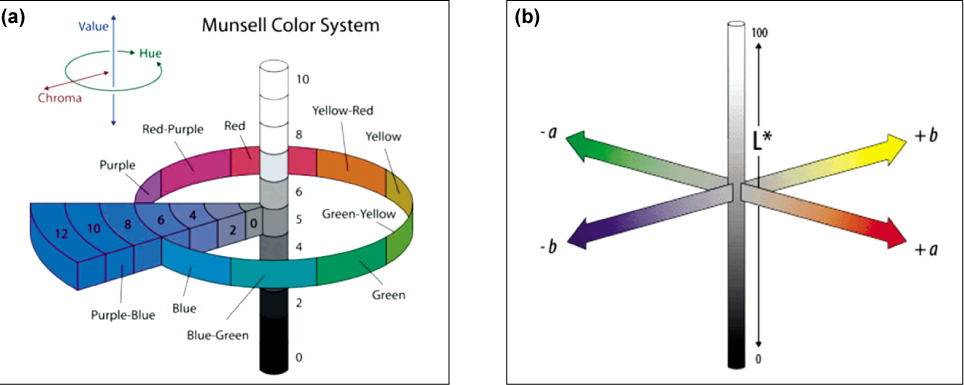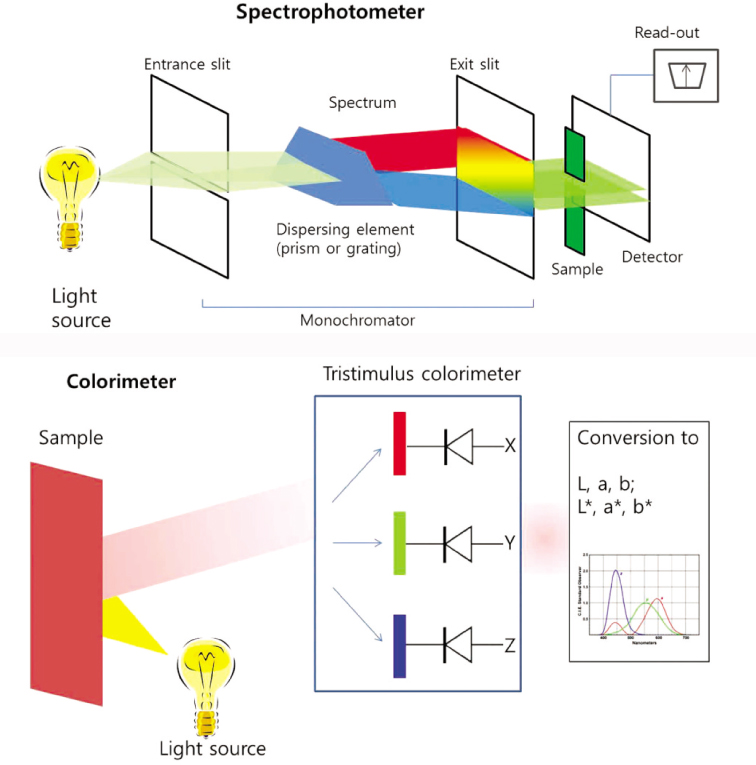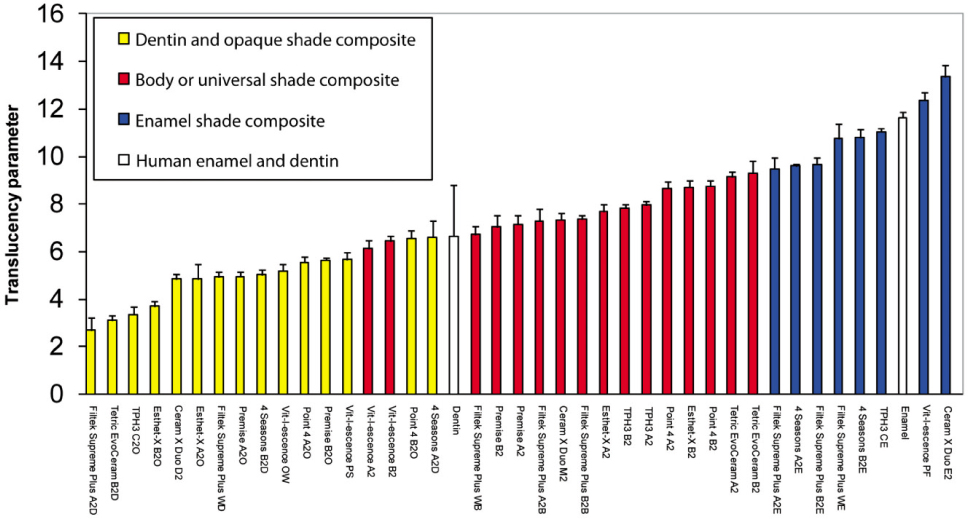J Korean Acad Conserv Dent.
2011 Jul;36(4):271-279. 10.5395/JKACD.2011.36.4.271.
Understanding of the color in composite resin
- Affiliations
-
- 1Department of Conservative Dentistry, Yonsei University College of Dentistry, Seoul, Korea. pjw@yuhs.ac
- KMID: 1986689
- DOI: http://doi.org/10.5395/JKACD.2011.36.4.271
Abstract
- In clinic, esthetic restoration of a defective natural tooth with composite resin is challenging procedure and needs complete understanding of the color of tooth itself and materials used. The optical characteristics of the composites are different because the chemical compositions and microstructures are not same. This review provided basic knowledge of the color and the color measurement devices, and analyze the color of the natural tooth. Further, the accuracy of the shade tab, color of the composite resins before and after curing, effect of the water, food and bleaching agent, and translucency, opalescence, and fluorescence effects were evaluated.
Keyword
Figure
Reference
-
1. Munsell AH. A color notation. Boston: G.H. Ellis Co..2. Paul S, Peter A, Pietrobon N, Hammerle CH. Visual and spectrophotometric shade analysis of human teeth. J Dent Res. 2002. 81:578–582.
Article3. Kim-Pusateri S, Brewer JD, Davis EL, Wee AG. Reliability and accuracy of four dental shade-matching devices. J Prosthet Dent. 2009. 101:193–199.
Article4. Blaes J. Today's technology improves the shade-matching problems of yesterday. J Indiana Dent Assoc. 2002. 81:17–19.5. Bolt RA, Bosch JJ, Coops JC. Influence of window size in small-window colour measurement, particularly of teeth. Phys Med Biol. 1994. 39:1133–1142.
Article6. Johnston WM. Color measurement in dentistry. J Dent. 2009. 37:Suppl 1. e2–e6.
Article7. Chu SJ, Trushkowsky RD, Paravina RD. Dental color matching instruments and systems. Review of clinical and research aspects. J Dent. 2010. 38:Suppl 2. e2–e16.
Article8. King KA, deRijk WG. Variations of L*a*b* values among Vitapan Classical Shade Guides. J Prosthodont. 2007. 16:352–356.9. Cal E, Sonugelen M, Guneri P, Kesercioglu A, Kose T. Application of a digital technique in evaluating the reliability of shade guides. J Oral Rehabil. 2004. 31:483–491.
Article10. Watts A, Addy M. Tooth discolouration and staining: a review of the literature. Br Dent J. 2001. 190:309–316.
Article11. Jahangiri L, Reinhardt SB, Mehra RV, Matheson PB. Relationship between tooth shade value and skin color: an observational study. J Prosthet Dent. 2002. 87:149–152.
Article12. Vaarkamp J, ten Bosch JJ, Verdonschot EH. Propagation of light through human dental enamel and dentine. Caries Res. 1995. 29:8–13.
Article13. ten Bosch JJ, Coops JC. Tooth color and reflectance as related to light scattering and enamel hardness. J Dent Res. 1995. 74:374–380.
Article14. Zijp JR, ten Bosch JJ, Groenhuis RA. HeNe-laser light scattering by human dental enamel. J Dent Res. 1995. 74:1891–1898.
Article15. Yuan JC, Brewer JD, Monaco EA Jr, Davis EL. Defining a natural tooth color space based on a 3-dimensional shade system. J Prosthet Dent. 2007. 98:110–119.
Article16. Paravina RD, O'Keefe KL, Kuljic BL. Color of permanent teeth: a prospective clinical study. Balkan Journal of Stomatology. 2006. 10:93–97.17. Goodkind RJ, Schwabacher WB. Use of a fiber-optic colorimeter for in vivo color measurements of 2830 anterior teeth. J Prosthet Dent. 1987. 58:535–542.
Article18. Zhao Y, Zhu J. In vivo color measurement of 410 maxillary anterior teeth. Chin J Dent Res. 1998. 1:49–51.19. Hasegawa A, Ikeda I, Kawaguchi S. Color and translucency of in vivo natural central incisors. J Prosthet Dent. 2000. 83:418–423.20. Odioso LL, Gibb RD, Gerlach RW. Impact of demographic, behavioral, and dental care utilization parameters on tooth color and personal satisfaction. Compend Contin Educ Dent Suppl. 2000. 29:S35–S41. quiz S43.21. Hasegawa A, Motonomi A, Ikeda I, Kawaguchi S. Color of natural tooth crown in Japanese people. Color Res Appl. 2000. 25:43–48.
Article22. Morley J. The esthetics of anterior tooth aging. Curr Opin Cosmet Dent. 1997. 4:35–39.23. Mayekar SM. Shades of a color. Illusion or reality? Dent Clin North Am. 2001. 45:155–172. vii24. Russell MD, Gulfraz M, Moss BW. In vivo measurement of colour changes in natural teeth. J Oral Rehabil. 2000. 27:786–792.
Article25. Browning WD, Contreras-Bulnes R, Brackett MG, Brackett WW. Color differences: polymerized composite and corresponding Vitapan Classical shade tab. J Dent. 2009. 37:Suppl 1. e34–e39.
Article26. Park JH, Lee YK, Lim BS. Influence of illuminants on the color distribution of shade guides. J Prosthet Dent. 2006. 96:402–411.
Article27. Ragain JC, Johnston WM. Color acceptance of direct dental restorative materials by human observers. Color Res Appl. 2000. 25:278–285.
Article28. Ruyter IE, Nilner K, Moller B. Color stability of dental composite resin materials for crown and bridge veneers. Dent Mater. 1987. 3:246–251.
Article29. Lee YK, Yu B, Lim HN. Lightness, chroma, and hue distributions of a shade guide as measured by a spectroradiometer. J Prosthet Dent. 2010. 104:173–181.
Article30. Barutcigil C, Harorli OT, Yildiz M, Ozcan E, Arslan H, Bayindir F. The color differences of direct esthetic restorative materials after setting and compared with a shade guide. J Am Dent Assoc. 2011. 142:658–665.
Article31. Kim IJ, Lee YK. Changes in color and color parameters of dental resin composites after polymerization. J Biomed Mater Res B Appl Biomater. 2007. 80:541–546.
Article32. Çelik EU, Aladag A, Turkun LS, Yilmaz G. Color Changes of Dental Resin Composites before and after Polymerization and Storage in Water. J Esthet Restor Dent. 2011. 23:179–188.
Article33. del Mar Perez M, Saleh A, Pulgar R, Paravina RD. Light polymerization-dependent changes in color and translucency of resin composites. Am J Dent. 2009. 22:97–101.34. Lee YK, Lim BS, Kim CW. Difference in polymerization color changes of dental resin composites by the measuring aperture size. J Biomed Mater Res B Appl Biomater. 2003. 66:373–378.
Article35. Yap AU, Sim CP, Loganathan V. Polymerization color changes of esthetic restoratives. Oper Dent. 1999. 24:306–311.36. Hosoya Y. Five-year color changes of light-cured resin composites: influence of light-curing times. Dent Mater. 1999. 15:268–274.
Article37. Bagheri R, Burrow MF, Tyas M. Influence of food-simulating solutions and surface finish on susceptibility to staining of aesthetic restorative materials. J Dent. 2005. 33:389–398.
Article38. Monaghan P, Trowbridge T, Lautenschlager E. Composite resin color change after vital tooth bleaching. J Prosthet Dent. 1992. 67:778–781.
Article39. Johnston WM, Ma T, Kienle BH. Translucency parameter of colorants for maxillofacial prostheses. Int J Prosthodont. 1995. 8:79–86.40. Li Q, Xu BT, Li R, Wang YN. Spectrophotometric comparison of translucent composites and natural enamel. J Dent. 2010. 38:Suppl 2. e117–e122.
Article41. Johnston WM, Reisbick MH. Color and translucency changes during and after curing of esthetic restorative materials. Dent Mater. 1997. 13:89–97.
Article42. Ryan EA, Tam LE, McComb D. Comparative translucency of esthetic composite resin restorative materials. J Can Dent Assoc. 2010. 76:a84.43. Lee YK, Yu B. Measurement of opalescence of tooth enamel. J Dent. 2007. 35:690–694.
Article44. Lee YK, Lu H, Powers JM. Measurement of opalescence of resin composites. Dent Mater. 2005. 21:1068–1074.
Article45. Primus CM, Chu CC, Shelby JE, Buldrini E, Heckle CE. Opalescence of dental porcelain enamels. Quintessence Int. 2002. 33:439–449.46. Yu B, Lee YK. Difference in opalescence of restorative materials by the illuminant. Dent Mater. 2009. 25:1014–1021.
Article47. McLaren EA. Luminescent veneers. J Esthet Dent. 1997. 9:3–12.
Article48. Zena R. Evolution of dental ceramics. Compend Contin Educ Dent. 2001. 22:12–14. quiz 19.49. Spitzer D, Bosch JJ. The total luminescence of bovine and human dental enamel. Calcif Tissue Res. 1976. 201–208.
Article50. Matsumoto H, Kitamura S, Araki T. Autofluorescence in human dentine in relation to age, tooth type and temperature measured by nanosecond time-resolved fluorescence microscopy. Arch Oral Biol. 1999. 44:309–318.
Article51. Monsenego G, Burdairon G, Clerjaud B. Fluorescence of dental porcelain. J Prosthet Dent. 1993. 69:106–113.
Article52. Lim YK, Lee YK. Fluorescent emission of varied shades of resin composites. Dent Mater. 2007. 23:1262–1268.
Article53. Lee YK, Powers JM. Metameric effect between resin composite and dentin. Dent Mater. 2005. 21:971–976.
Article
- Full Text Links
- Actions
-
Cited
- CITED
-
- Close
- Share
- Similar articles
-
- Color Matching of Single-Shade Composite Resin by Various Pulp Capping Materials in Anterior Teeth
- Evaluation of the Color Adjustment Potential of Single-Shade Composite Resin in Primary Teeth
- Influence of the color of composite resins applied to lingual surface on the labial tooth color
- Color Stability of Alkasite Restorative Material: in vitro Studies
- Color evaluation of low viscosity bulk-fill resin with composite resin capping layer




